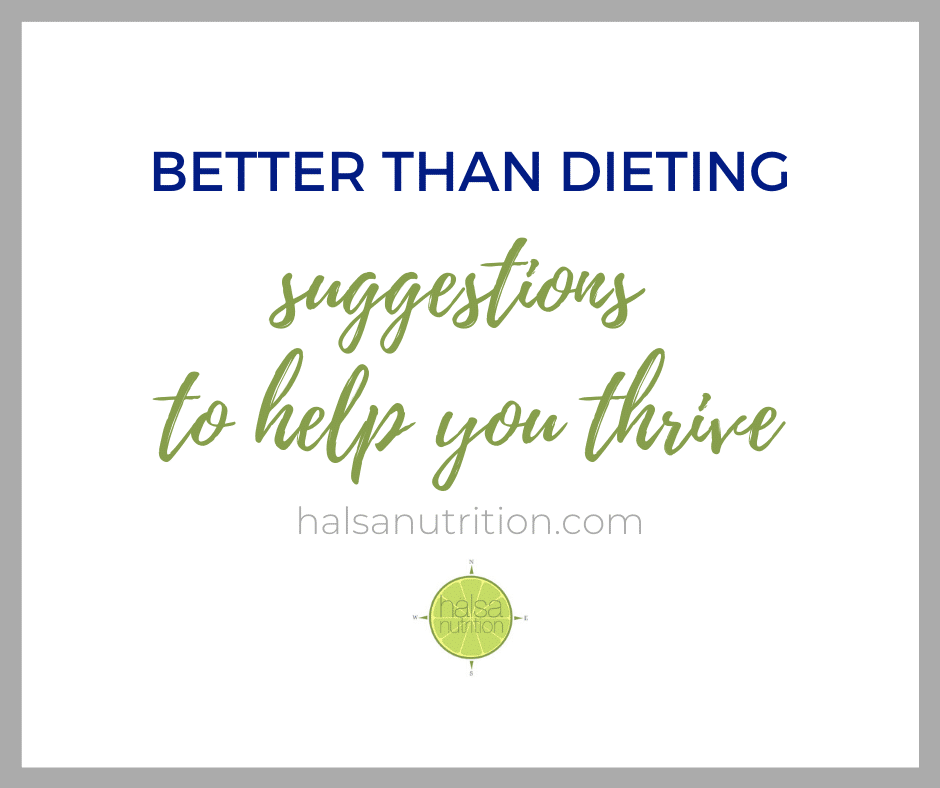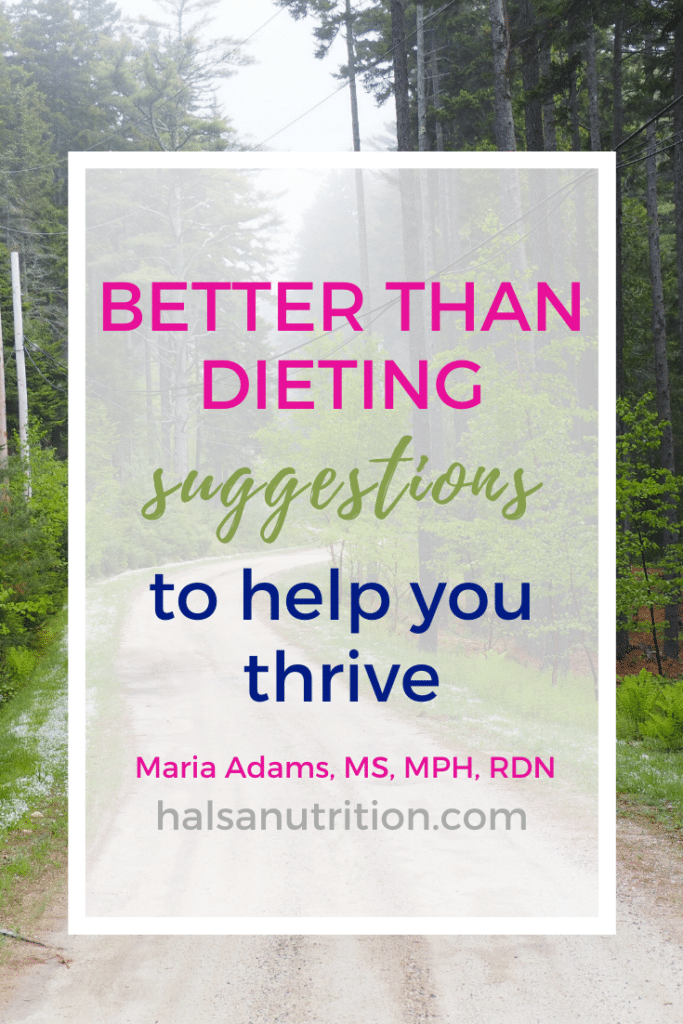
Better Than Dieting: Suggestions to Help You Thrive
Better than dieting! It’s time to shift your time and energy away from diet culture and instead practice thoughts and habits that make you feel good. Read on for more information and suggestions to help you thrive.
Diet Mindset Quiz
Ok, here is a question for you…
Have you ever:
a. Tried to follow a diet.
b. Tried to follow “healthy” eating guidelines.
c. Continuously obsessed about what you should or shouldn’t eat.
d. All of the above.
If you answered “d. All of the above.” you’re not alone. Most people in our society have dieted or restricted food at some point, which generally also leads to thinking about food all the time.

If you have been lucky enough to avoid dieting, there is still a good chance you have done “b. Tried to follow healthy eating guidelines.” This may seem like the healthy thing to do, but it’s not if it leads you to feel like you can’t eat what you want or leaves you feeling bad about having eaten a certain food or amount of food.
Now there are certainly some people who don’t pay attention to healthy eating guidelines and others who keep them in the back of their minds but don’t obsess about them. However, for many people, guidelines and diets steal the spotlight when it comes to food decisions.
And, as it turns out, obsessing about healthy eating isn’t healthy. Restricting our food intake isn’t healthy. Listening to recommended serving sizes instead of your own body isn’t healthy. Denying cravings isn’t healthy. In other words, all these diet behaviors can lead to a lot of unnecessary stress and noise. So instead, this year I urge you to shift your mindset. (Read about why dieting is not helpful and even harmful here.)
Shift Away From Diet Culture
It’s time to shift your time and energy away from diet culture and instead practice thoughts and habits that make you feel good. Focus on taking care of your body in ways that don’t involve measuring your food or weight or labeling foods as good or bad.
It’s time to show yourself the kindness and compassion you deserve! Not only is this so important for you, but it’s important for those around you, especially your kids who look to you as a role model and life guide. Of course, if your significant other or close friends are also wrapped up in diet culture, it may take time for them to come around to seeing things from this new perspective.
Suggestions to Help You Thrive
So what should you do to ditch the diet mindset and care for your body in a more loving way?
1. Be patient.
First, realize that this whole process takes time. It can take months or even years to truly shift your mindset and habits away from diet culture. I urge you to read up on Intuitive Eating and Health at Every Size® (HAES®). Whether you are skeptical, intrigued, or already want to learn everything you can about IE and HAES® I also highly recommend the following resources:
- Christy Harrison – her podcast is excellent and her new book, Anti-Diet, is a must-read
- Intuitive Eating by Evelyn Tribole and Elyse Resch – website includes a directory to Certified Intuitive Eating Counselors
- Rebecca Scritchfield – her book Body Kindness and podcast are awesome
- Association for Size Diversity and Health (ASDAH)
2. Focus on self-care.
Sure, we hear this phrase all the time but that’s because it’s really important! Ask yourself, “What do I need most?” and give yourself that. Here are some nourishing practices to consider:
- Go to bed earlier. Or maybe even sleep later. Sleep is an amazing thing. Consider making an evening routine.
- Create a morning routine.
- Rest when you need to. Calling all moms! It’s ok to take an afternoon break and sit down with a cup of tea and a magazine or to take a nap if you need it!
- Spend less time on social media.
- Limit screen use. Spend more time away from all screens.
- Read for pleasure.
- Move more in ways that you enjoy. Exercise is a known mood booster, but not if it’s something that we don’t enjoy or leaves us in pain. Find movement that makes you feel good.
- Get outside into nature more. Research shows that people who get out in nature daily tend to be happier! This could be as simple as taking a coffee break outside in your yard or walking through a local park.
- Make more lunch or dinner dates with friends.
- Call friends or family members more often.
- Do more enriching activities. This could be visiting museums, traveling, or learning about a different culture.
- Declutter your house. One drawer or closet at a time. This is another proven mood booster.
- Clean your house. (Or hire cleaners if you could use a little help!)
- Learn a new skill or hobby. (Or just rest!)
- Do more random acts of kindness for others.
- De-stress more regularly.
- Treat yourself! Whether it’s an appointment at the salon, a massage, or more bubble baths at home. You are worth it!
3. Make eating and cooking more joyful!
Ok, so if you want to focus on food, this is where to put that focus…
- Eat freely without rules. Let yourself eat the foods you crave. Chances are you will crave both nutrient-rich foods like fruits and vegetables and joy-rich foods like freshly baked cookies.
- Don’t judge your eating patterns. Sometimes we overeat, sometimes we get over hungry, sometimes we don’t eat mindfully, and sometimes we choose foods that make us feel bloated. It’s ok. Don’t be so hard on yourself. Just acknowledge and let it go. Show yourself some extra love instead.
- Make mealtimes special. Ok, so I know that if you have kids there is a good chance that mealtimes are often chaotic, messy, and quick. But, when you can, slow it down. Get your kids to help set and clear the table, use cloth napkins, serve meals family-style, practice gratitude, and maybe even light a candle. Read my suggestions for more joyful family dinners here.
- Learn to cook a new recipe. Cook it once and you will realize that wasn’t so hard. Cook it 3 times and you will barely have to look at the directions anymore.
- Teach your kids to cook. Whether it’s mastering scrambled eggs or a 3-course dinner, this is one of the greatest gifts you can give them.
- Declutter and organize your kitchen. This may be the first thing you should do. It feels so good and will make you more motivated to cook.
- Breakfast in bed! How about this for an occasional Sunday treat!?
Seek out Professional Help
Finally, if you could use a little extra help, you are not alone. Seek out the help you need. Whether it’s talking to a therapist or a Registered Dietitian who specializes in Intuitive Eating. Depending on your situation, you may also benefit from meeting with a dietitian who specializes in eating disorders. Eating disorders and disordered eating habits are super common in our society, to the point where they often become normalized because so many of us are dieting or restricting in some way. But by seeking help you can help yourself and those around you start to change this.

Leave a Reply